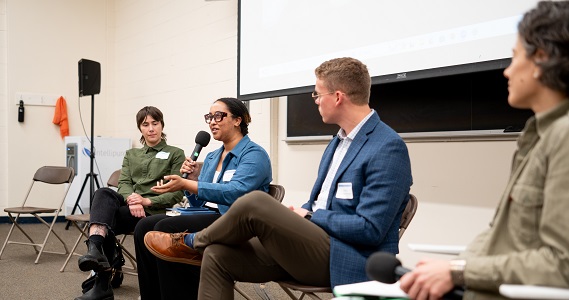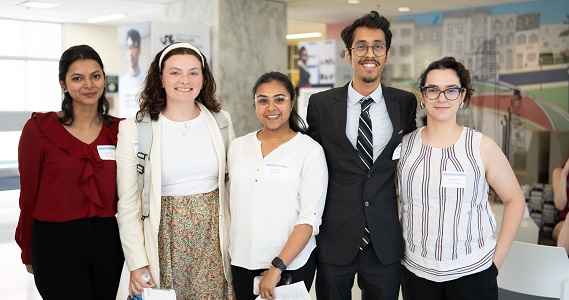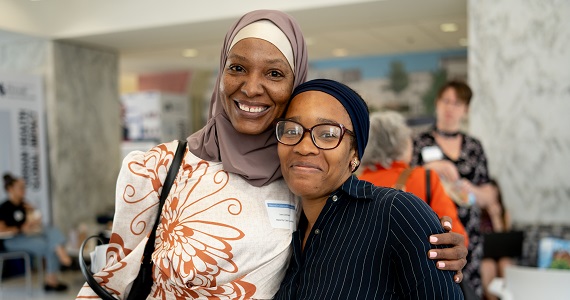“Our goal was not just to provide another talk about the effects of climate change and heat. We aimed to dive deeper into how extreme heat effects women, infants, and children biologically and socially," said Renee Davis, MD, MPH, Drexel's MCH Program Coordinator and one of the event's organizers. "Attendees heard from people who are making efforts to establish an evidence-base through research and science, reduce inequities such as the increased exposure burden faced by women and children, support programs in communities, and advocate for increased education and policy change to help protect those most at risk."
"The impact of heat on maternal and child health is not something I really even thought of as an issue beforehand, but from learning from the keynote speaker and the panelists, it is something that deserves a lot more attention." - Marissa Campbell, MPH student & MCH trainee
Keynote: Extreme Heat Affects Early Childhood Health and Development
The symposium opened with a presentation by keynote speaker Lindsey Burghardt, MD, MPH, FAAP, Chief Science Officer at the Center on the Developing Child at Harvard University and founder of the Center’s Early Childhood Scientific Council for Equity and the Environment.
Dr. Burghardt delivered insightful information about the impact of extreme heat exposure on child development, including the body’s physiologic response to heat and how increased heat exposure negatively influences cognitive, emotional, and physical development. She also discussed how historical practices like redlining and lack of financial investment have resulted in the creation of neighborhoods dominated by heat-trapping asphalt, densely concentrated buildings, more traffic, industry, and highways, all of which contribute to the heat island effect.
“Multiple studies show that because of a longstanding lack of investment in things like parks and greenspace that decrease temperatures, nearly all US neighborhoods that were subject to redlining are hotter today than non-redlined neighborhoods,” said Dr. Burghardt. She ended with inspiration for attendees, sharing strategies to reduce heat exposure and in turn promote healthy child development for all children.
 Blean Girma, MPH, speaks during the "Building the Workforce" panel discussion.
Blean Girma, MPH, speaks during the "Building the Workforce" panel discussion.
Building the MCH Workforce Panel Discussion
Attendees then heard from current and former trainees who have focused their research on climate and maternal and child health.
These rising leaders and scientists, included Rhea Goswami, a current undergraduate who is also the founder of the youth-led Environmental Justice Coalition and three doctoral students at various points in their training (Blean Girma, MPH; Lisa Frueh, MPH, PhD(c); and Rachit Sharma, MBBS, MPH, PhD(c)) who touched on working with environmental justice community partners, reproductive justice and health equity, research related to schools as a protective factor against the effects of heat on children, and preparing for a post-doctoral degree in this space.
Dr. Tim Nelin, a neonatal-perinatal medicine fellow, discussed his research related to the effects of extreme heat on premature infants and how he envisions incorporating climate-related health into clinical care.
Dr. Daniel Carrion, a former trainee who is now an assistant professor highlighted important skills to develop while in training, the importance of mentorship, and stressed to always remember the populations most impacted and why we are doing this work.
Panelists also shared insights about their journeys into the field and gave advice for students interested in pursuing this work.
A Federal Perspective on Extreme Heat and Maternal and Child Health
The event also hosted Dalton Paxman, PhD, and Gabby Battaglia, MPH, from the Region 3 Office of the Assistant Secretary for Health of the U.S. Department of Health and Human Services (HHS). The pair explained the role of the HHS in protecting the health of people and shared a plethora of preparedness tools that governments, communities and individuals can use to help reduce excessive heat exposure.
Attendees were encouraged to follow up with Dr. Paxman and Ms. Battaglia during the networking lunch or after the event to learn more about these tools and how they can be used by researchers, government programs, community-based organizations, and families.
 Members of the MCH Student Organization helped to organize the event.
Members of the MCH Student Organization helped to organize the event.
Innovative Programs & Local Strategies to Minimize Heat Exposure
A panel of community-based and government professionals shared information about current programs being implemented to minimize heat exposure across the Northeast. Panelists represented a local neighborhood advisory committee, programs focused on Pennsylvania daycares and schools, a program working to integrate climate health into clinical care, and the Philadelphia Department of Public Health. The panelists discussed the importance of educating families, clinicians, and teachers/school administrators about the topic.
They also stressed the importance of finding better ways to bring the issues related to the effects of extreme heat on women and children to the attention of policymakers and funders. “It’s not political, it’s survival,” said Tamara Peffer, MS, Executive Director of the PA Department of Education, speaking on the importance of putting adequate efforts and resources towards protecting people from rising temperatures.
Strengthening the Evidence of Extreme Heat Affects
The day culminated with a panel highlighting current research efforts to better understand and improve the MCH outcomes resulting from excessive heat exposure. Panelists discussed research on the effects of extreme heat on infant mortality in Philadelphia and some of the reasons why women and children are specifically vulnerable to extreme heat including exposure inequities. They explained some of the methodological challenges faced by researchers doing this work including study design and confounding variables. Other challenges discussed were the associations of extreme heat with poor air quality, housing and school inequities among those most impacted, and reduced land cover or green space in urban areas such as Philadelphia.
 Attendees enjoyed a networking lunch following the MCH symposium.
Attendees enjoyed a networking lunch following the MCH symposium.
Panelists highlighted the need for transdisciplinary collaboration, patient-centered approaches, and including community input early in the conversations about measures and research to reduce heat exposure.
They also discussed how research in this space is important to help to establish an evidence-base to be used to inform policymakers.
“This year’s symposium was my first, and I truly learned a lot about the topic at hand. The impact of heat on MCH is not something I really even thought of as an issue beforehand, but from learning from the keynote speaker and the panelists, it is something that deserves a lot more attention, said Marissa Campbell, a first-year MPH student and MCH Trainee at Dornsife. "As I move forward in my public health career within MCH, this event is something that I will continue to look back on. It was wonderful to get the opportunity to meet so many different stakeholders and professionals throughout Philadelphia and beyond."
In-person and online attendees all learned something new about the impacts of extreme heat on women and children, tools and strategies to help reduce this impact, and methodological challenges related to this work. "We hope attendees connected with each other and the speakers and will continue having these important conversations," said Dr. Davis.
The MCH program and its co-sponsors appreciate everyone attending the symposium. You may access the full program and all speaker bios on Dropbox here.
Extreme Heat Research and Resources from Panelists:
Learn more about Dornsife’s MCH program and upcoming MCH events.
Dornsife's Maternal and Child Health Program is supported by the Health Resources and Services Administration (HRSA) of the U.S. Department of Health and Human Services (HHS). The contents are those of the author(s) and do not necessarily represent the official views of, nor an endorsement, by HRSA, HHS, or the U.S. Government. For more information, please visit HRSA.gov.